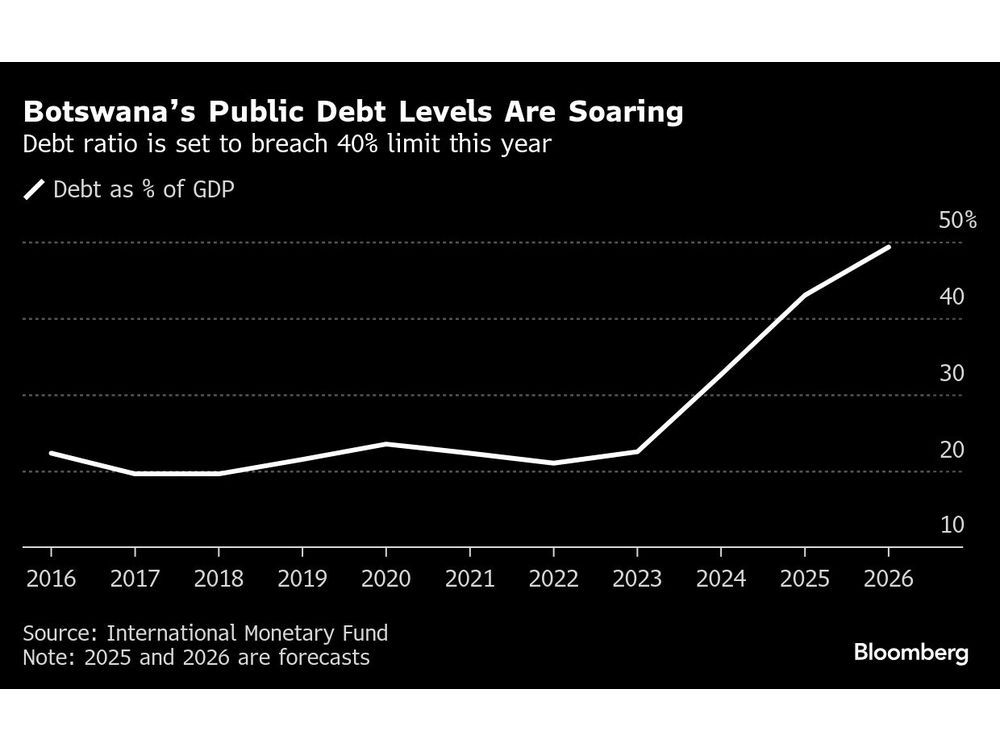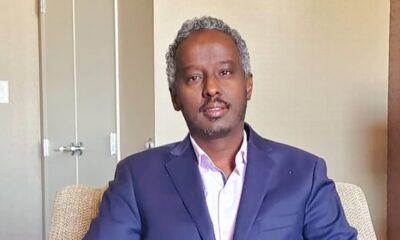Top Stories
Lab-Grown Diamonds Trigger Economic Crisis in Botswana

URGENT UPDATE: Botswana is facing an economic crisis as the rise of lab-grown diamonds threatens its once-thriving natural diamond market. Patients are queuing for hours at government clinics, construction firms are laying off workers, and students are threatening to boycott classes due to unfulfilled promises. The situation has escalated rapidly, with President Duma Boko declaring a public health emergency just weeks ago.
The nation, home to 2.5 million people, is grappling with an economic downturn that has reversed years of progress. The diamond industry, which has traditionally accounted for 80% of Botswana’s exports and a third of government income, is in turmoil. The emergence of affordable lab-grown gems has slashed demand for natural diamonds, especially in the United States, which is the largest market for these precious stones. Last year, lab-grown diamonds represented nearly 50% of engagement ring purchases, up from just 5% in 2019, according to data from jewelry insurer BriteCo Inc.
The crisis has triggered widespread social unrest. Patients like Galeemiswe Mosheti, a 42-year-old diabetes sufferer, report waiting up to eight hours for medication, compared to just one hour last year. “We’re spending long periods in the queue and our jobs suffer,” he lamented. As a result, many are struggling to make ends meet, with taxi drivers losing income due to extended wait times at clinics.
Construction companies, heavily reliant on government contracts, are also feeling the squeeze. “Most of our members have had to retrench workers,” stated Tshotlego Kagiso, chairman of the Tshipidi Badiri Builders Association. Many firms have halted operations entirely, leading to thousands of job losses amid dwindling government spending.
The situation has prompted the government to seek foreign investment. On August 21, Boko announced a potential deal with Al Mansour Holdings from Qatar, aiming for an investment of $12 billion. However, details on how this capital will be utilized remain sparse, raising concerns about the credibility of such promises.
Economic indicators reveal a stark decline. The International Monetary Fund (IMF) forecasts Botswana’s fiscal deficit to reach 11% of GDP by 2025, the largest shortfall since the global financial crisis in 2009. Government debt is projected to soar to 43% of GDP, nearly doubling within two years. In June, the finance ministry revised its growth forecast from 3.3% to a potential contraction of 0.4%.
The diamond crisis has ramifications beyond immediate economic decline. Botswana, once heralded as a model of prosperity, is now facing an existential threat. President Boko highlighted the urgency in a recent address: “While diamonds served us well, we know painfully today that this model has reached its limits.”
As the government grapples with dwindling revenues and liquidity challenges, the outlook appears grim. Botswana is turning to debt financing, securing $304 million from the African Development Bank and $200 million from the OPEC fund in July. The nation’s investment-grade credit rating is under threat, with agencies like Moody’s and S&P Global Ratings downgrading its outlook to negative this year.
The diamond sector, which employs only a fraction of the population, is being urged to diversify. Tourism, primarily driven by luxury safaris, contributes just 12% of GDP. The nation’s dependency on a single commodity model has left it vulnerable to dramatic shifts in global demand.
Looking ahead, Botswana’s government is facing crucial decisions. A mid-term budget review is set for next month, and plans for economic diversification are more urgent than ever. However, without the necessary funds, ambitious plans for renewable energy, technology, and agriculture may remain unrealized.
As Botswana navigates this precarious moment, the implications are profound. The diamond market may never recover, signaling a significant shift in the economic landscape of southern Africa. The country must now pivot towards sustainable growth strategies to safeguard its future and the well-being of its citizens.
-

 Politics4 weeks ago
Politics4 weeks agoSecwepemc First Nation Seeks Aboriginal Title Over Kamloops Area
-

 World5 months ago
World5 months agoScientists Unearth Ancient Antarctic Ice to Unlock Climate Secrets
-

 Entertainment5 months ago
Entertainment5 months agoTrump and McCormick to Announce $70 Billion Energy Investments
-

 Science5 months ago
Science5 months agoFour Astronauts Return to Earth After International Space Station Mission
-

 Lifestyle5 months ago
Lifestyle5 months agoTransLink Launches Food Truck Program to Boost Revenue in Vancouver
-

 Technology3 months ago
Technology3 months agoApple Notes Enhances Functionality with Markdown Support in macOS 26
-

 Lifestyle3 months ago
Lifestyle3 months agoManitoba’s Burger Champion Shines Again Amid Dining Innovations
-

 Top Stories2 months ago
Top Stories2 months agoUrgent Update: Fatal Crash on Highway 99 Claims Life of Pitt Meadows Man
-

 Politics4 months ago
Politics4 months agoUkrainian Tennis Star Elina Svitolina Faces Death Threats Online
-

 Sports5 months ago
Sports5 months agoSearch Underway for Missing Hunter Amid Hokkaido Bear Emergency
-

 Politics5 months ago
Politics5 months agoCarney Engages First Nations Leaders at Development Law Summit
-

 Technology5 months ago
Technology5 months agoFrosthaven Launches Early Access on July 31, 2025




















